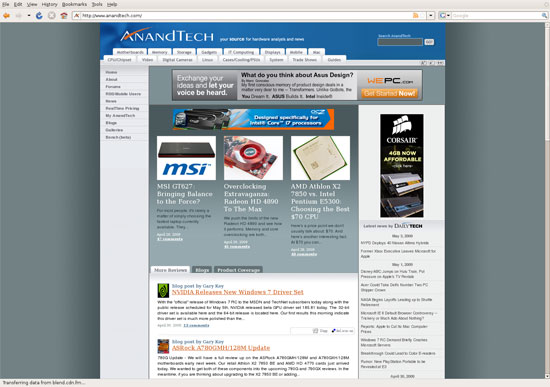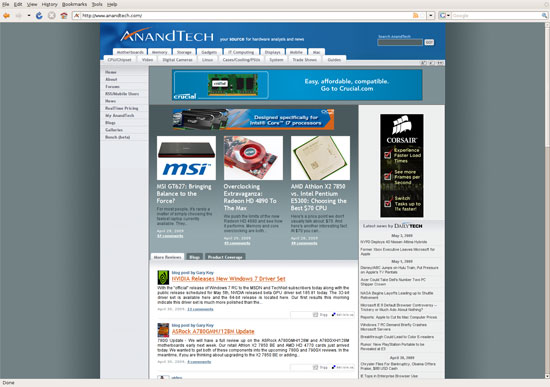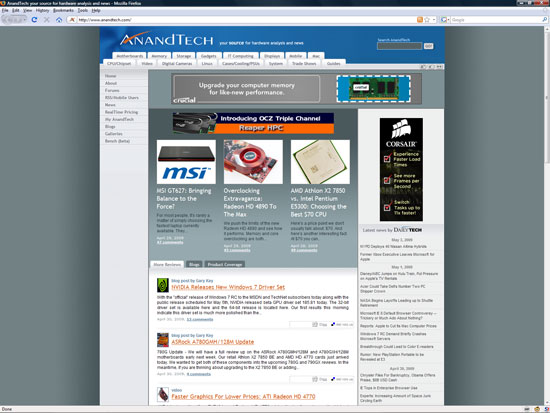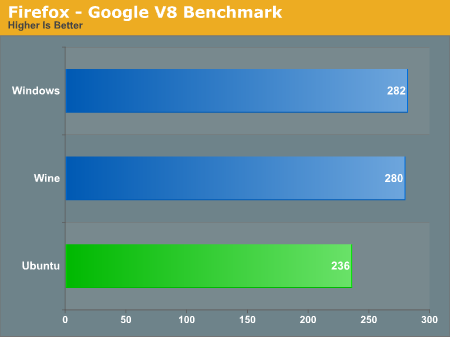Revisiting Linux Part 1: A Look at Ubuntu 8.04
by Ryan Smith on August 26, 2009 12:00 AM EST- Posted in
- Linux
Applications: Web Browsing
Windows Default: Internet Explorer 7
What I use: Firefox 3
Ubuntu Default: Firefox 3
Much to the chagrin of Microsoft, the web browser is turning in to a miniature OS of its own, and in the case of anything that’s not Internet Explorer, it’s a miniature OS that has no allegiance to a real operating system. It’s the primary way to retrieve most information from the internet, applications can be created through AJAX and Flash, video can be watched (see: Hulu). A good cross-platform web browser removes a great deal of the need to use any specific OS, and this is something that works in Ubuntu’s favor.
Ubuntu ships with Firefox 3, Internet Explorer’s loyal opposition and currently the #2 browser on the market. So long as a site isn’t built for IE6 Firefox has great compatibility, good speed, and an army of extensions to add features to it. Since many of you already use it, there’s not a lot to say here: it’s a very solid browser, and something I find to be superior to Internet Explorer.

As I already use Firefox under Windows, the transition here was virtually non-existent. Ubuntu doesn’t have any direct Windows to Ubuntu transition tools, but after moving my Firefox profile from Windows to Ubuntu and reconfiguring a few location-sensitive settings, I was up and going. Internet Explorer users are going to have more of a transition obviously, but it’s not much. All of the major browsers’ core behaviors are the same, which makes it easy to switch among them with little fuss.
At the risk of marginalizing the rest of Ubuntu, I consider Firefox to be one of the core components that makes Ubuntu a success story. Because so much computer use these days is inside a browser, it has become a lynchpin for a good OS. If your browser is bad, then it’s probably hurting the usability of your OS if it means that many users cannot do something they regularly do on another browser. One only needs to look at the early versions of Mac OS X to get a good picture of this, as it shipped with the only-bearable Internet Explorer 5.
There are however a few caveats that I’d like to hit on. Something that continues to throw me for a loop is that while it’s the same Firefox I use under Windows and Mac OS X, it doesn’t necessarily look the same. The rendering engine is the same, but OS differences start to play out here. Mac OS X, Windows, and Ubuntu all render text slightly differently, and in the case of Ubuntu come with a significantly different font set. Because Firefox is at the mercy of the OS for fonts, what you get are small but noticeable differences in how the same page looks.

Firefox with default fonts

Firefox with MS Core fonts

Firefox under Windows
Above we have AnandTech rendered in Firefox 3 on Windows, and Ubuntu. On Windows Firefox uses Times New Roman and Arial for its default fonts, but these fonts do not exist on Ubuntu; rather Ubuntu uses what’s called “serif” and “sans-serif”. This along with how the two OSs differ in font anti-aliasing results in the different look of Firefox under Ubuntu. Having used Windows for a number of years, I have never gotten past the idea of Ubuntu looking “wrong” even though the right look is entirely subjective.
Ultimately I ended up adding the missing fonts by installing the msttcorefonts package, which contains Times New Roman, Arial, and the other “big name” standard fonts. With those installed and Firefox configured to use them, text looks much closer, although not quite the same. It’s a shame that Ubuntu can’t include these fonts by default.
The second caveat is one of performance. When using Javascript-heavy sites in particular, Firefox on Ubuntu seems just a bit slower than under Windows. I had never been able to figure out why until I saw this Slashdot article. Firefox for Linux is not compiled with profile guided optimization, a method of improving the performance of binaries by looking at how they’re used. While Ubuntu compiles their own releases of Firefox, they do the same thing. As a result, there’s a speed difference in Firefox – it’s the same code, but the Windows version is compiled in such a way that it’s faster. As I wrote at the start of this article, I’m not concerned with the performance of Ubuntu or its applications for the most part, and this falls under that notion. Firefox is slower, but not to the point that I care. It’s interesting enough that it bears mentioning, however.
Just to give you an idea of what the speed difference is, here’s a breakout of one of our Firefox benchmarks from the benchmarking section later in this article:

As you can see, in this Javascript-heavy test Firefox on Ubuntu is upwards of 17% slower than it is under Windows. As this performance gap manifests itself largely under Javascript-heavy situations; regular browsing doesn’t show nearly the difference. Flash is also slower, but this has nothing to do with Firefox and more to do with Flash’s mediocre performance under any OS that isn’t Windows.
The last caveat is one of how Ubuntu’s distribution model becomes strained when it comes to Firefox. Ubuntu Hardy shipped nearly 2 months before Firefox 3 did. But because Ubuntu is meant to be a stable platform they still needed to package Firefox 3 with the OS, so Firefox 3 Beta 5 was included. If we had done this article a month after Hardy launched as intended, I’d have few nice things to say. Firefox 3 Beta 5 combined with Adobe Flash 9 was buggy, unstable junk. Canonical made the right decision as the final version of Firefox 3 turned out well, but it highlights the pitfalls of including 3rd party software with the OS.
The flip side of this caveat is that Firefox 3.5.x has superseded 3.0.x as the newest Firefox branch, which means that only 3.0.x versions are being pushed out to Hardy. This means if you want to take advantage of any of Firefox’s newest features such as the new javascript engine, you’ll need to install a 3.5.x build separately, ideally through a PPA package so that it cleanly replaces the default version of Firefox.
But even with those caveats, none of them are serious issues. Firefox 3 is still a fantastic browser and there’s nothing else I’d rather have on Ubuntu.
Final Verdict: Meets My Needs










195 Comments
View All Comments
amrs - Saturday, September 26, 2009 - link
Your ignorance and stupidity is showing here. No engineering software for Linux? Hello? Matlab is available, Simulink is available, Labview the same. Xilinx and Altera have supported Linux for a long time and so do the smaller FPGA houses like Lattice and Actel. Mentor Graphics too. Orcad is the only one you mentioned that isn't available on Linux, but Cadence does support Linux with their Allegro product and so does Mentor Graphics with PADS and Board Station and Expedition.MadIgor - Thursday, September 24, 2009 - link
I have to disagree. You are NOT talking abut average Joe/Jane. I think that even the article author is kind of biased towards enthusiast user. Ubuntu actualy completes all needs of average Joe/Jane user, you can browse www, you can do email/scheduling, you can play games (easy non enthusiast games), you can DL pictures from your camera and edit them, you can even playback mp3/CD and video, do basic office work, all out of the box. The gnom learning curve for PC beginners is much shorter then with windows. Most of the average Joes/Janes dont install aps or peripherals by themselfs, belive me I had to install it for them many many times on Win systems (the best is "installing" digital camera: plug one wire end in camera, other in PC). Yes I agree that installing Ubuntu so that ALL is runing right may be pain in the ass, but average Joe/Jane naever install their system (not Win, nor MacOS), but when they get the PC with preinstalled Ubuntu you are done. With windows you have to worry that they will "bother" you every few months with non working system. Yes it might be nice source of income for PC technician, but not always welcome as reliability advertising (for customer to come).I did some instalation of Ubuntu to my customers mostly as a "safe" web/mail PC, they all where used to windows platform already, after one week of using Ubuntu even the hardest critisizer where comfy to use Ubuntu (some even asked me to install it on their home PCs), The most "problem" was: that no one can read our "excel" files. So I showed them that it has to be saved with .xls extension and voila, no more problems. I was NEVER asked for any CAD system, nor MATHLAB, not even Graphics apps, all what they used in offie was already there! Then there are home users, only complaint was that thay had windows at work, but after few houres all was fine, only kids had problems that they cannot play enthusiast games on it. My wife is running Ubuntu for three years now, with no problem. When my 62 year old mother asked me for a computer I brought her a notebook with Ubuntu, had no time to explain it comming next mornig. My mom never used a computer before (ok shooting ships on my ATARI doesnt count), next mornig I came there, she was already browsing. I asked her how did she do that and she said its easy, tap the aplications then internet and one of the apps was "internet". She even installed the snake game, Isaid how did you do that, she said in aplications section is install new aplication, then she clicked on games and then she piscked what she tought would be the game for her and then install, whas that wrong? she asked, I said NO, its right.
BTW no one knows that they can use CLI or that there is some terminal window in Ubuntu. They are average Joes/Janes.
Not everyone is an enthusisat with PC full of stuff that, and be honest, you dont use on dayli base.
The truth is that Ubuntu will not be a succesfull system for enthusiast or high level profesionals until big software houses (Adobe, hallo!) and game producers will not start to port software for Linux. But that is not fault of Ubuntu or linux and again we are not talking here about majority of users (I mean Joes/Janes).
fazer150 - Friday, September 4, 2009 - link
All folks who think Linux is hard. Have you tried PCLinuxOS? this is easier to install, use than Windows XP, 2003 and Vista period.there is no Windows hatred here, but you have to try that before you complain.
I have access to all Windows OS at work including the latest Win 7 RC but i find PCLinuxOS easy to setup and use. Needs no special admin skills every config is GUI driven.
Linux has come a long way from where it was 5 years ago!
Cynicist - Sunday, September 6, 2009 - link
There are two things I'd like to comment on that bothered me about this article. Firstly, most regular users do not use LTS, the software is just too old and the latest releases of Ubuntu are quite stable. LTS is mostly guaranteed stability for corporate environments.Second, this package manager hatred is based on this flawed idea that no packages exist outside of the official repositories. A simple google search for deb packages leads to GetDeb.net, a website dedicated to providing up to date packages of all kinds of software specifically for Ubuntu. Google search too hard you say? But its even less difficult to find packages because many project sites (such as wine, featured in this article) include multiple packages for various distributions and even PACKAGE TYPES.
Overall not a bad article. The author definitely knows technology and I'm grateful for that, but he did not seem to do much research on the actual community itself or the Linux Way of doing things. These are minor issues which will resolve themselves with time and I'm looking forward to seeing more linux articles on this site in the future.
cliffa3 - Thursday, September 3, 2009 - link
I was concerned as well with the constant releases...until I upgraded the first time. I had set aside the better part of an evening because I was *sure* there were going to be plenty of headaches. I've done three such version upgrades now and am happy (not to mention shocked) to report that it's literally a one click upgrade. Simply amazing. I'm sure something will get mucked up in the future with one of the version upgrades for me...but for now all has gone amazingly smooth.That being the case, I have to disagree with you on the "they release too often" point. I understand it's a pain to sift through all the search results on the forums, but I also have found some older threads (sometime 3 versions back) that the same fixes work for my issue. I agree they need to tag posts with version info...that would make it far easier. Also, there's far more useful information in the (versionally-diluted) forums than I've found for any other piece of software or OS I've used. I almost don't cringe when I have a problem or issue now because I'm quite confident I can find the information without too much digging.
I'd encourage you to upgrade versions from your current install (don't wipe) and comment on how the process goes. Maybe I've just had an extremely easy (and lucky) go of things with no problems...it'll be interesting to read your experiences. Honestly with how easy my upgrades have been, I look forward to new releases (but still give them a few weeks before upgrading...just to see the comments from other users).
Mem - Wednesday, September 2, 2009 - link
Very good read as usual,personally I like to see Kubuntu reviewed at some point(I hear Kubuntu 9.10 is due in Oct) ,as you know its the KDE version,also Gnome and KDE compared would be interesting.I think the main problem for new Linux users is which one to go with,sure they are all free but it can be confusing and time consuming to try them all,some are more noob friendly then others like Ubuntu/Mint.
lishi - Wednesday, September 2, 2009 - link
Since you spend so many time dealing with the windows its worth pointing that compiz is actually much more powerful then what you wrote.Install the package ccsm-simple for more option.(like different application selector, different windows animations etc).
Or install ccsm for the complete configuration tools. Given most of them are eye-candy there some who can improve the desktop experience.
sethk - Tuesday, September 1, 2009 - link
In this sentence:"It’s undoubtedly a smart choice, because if Ubuntu wiped out Windows like Windows does Ubuntu, it would be neigh impossible to get anyone to try it out since “try out” and “make it so you can’t boot Windows” are mutually incompatible"
The more common phrase is 'nigh on impossible' (as in close to impossible) or you could say it's nigh-impossible. Definitely not neigh. Sorry to point out grammar issues, but this is a pet peeve, right along with pique being spelt peak or peek (as in pique my interest).
v8envy - Tuesday, September 1, 2009 - link
I've been a 100% Linux desktop (Ubuntu 9.04) user at home ever since I bought my last i7 920. Gaming, multimedia, web -- everything a typical desktop user does under Windows. The inconvenience of migrating an existing Windows install & re-activation outweighed the convenience using Linux which simply booted and worked on the new hardware.Yes, there are times where you must fire up Google and search for solutions, some of which are commands to be pasted into a terminal window. Yes, sometimes you need to upgrade software packages (Wine is horribly out of date for instance).
On the other hand, with Windows you get apprximately 1,337 updaters which run on startup, virus checkers, malware checkers, browser parasite checkers, firewalls, DRM and misc layers of barnacles which accumulate the longer you use the system. Thankfully the gathering of cruft is not a bane on the typical Linux system yet.
Try 9.04 and see if it is more to your liking. LTS means nothing when most open source problems are "supported" by simply upgrading to the latest software.
trexpesto - Monday, August 31, 2009 - link
"linux" is "niche" spelled inside out and backwards..in rot13.